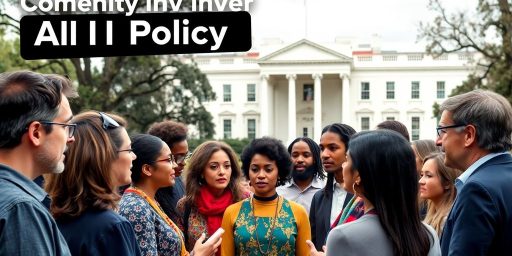The White House has reported an overwhelming response to its call for public input on its artificial intelligence (AI) action plan, receiving over 10,000 comments. This surge in engagement highlights the growing interest and urgency surrounding AI technology as the global competition for AI leadership intensifies.
Key Takeaways
- Over 10,000 public comments received on the AI action plan.
- Major tech companies like OpenAI, Meta, Amazon, Google, and Microsoft participated.
- Key themes include national security, investment in energy resources, and infrastructure improvements.
- Concerns raised about international competition, particularly from China.
Widespread Participation from Stakeholders
The comments came from a diverse array of stakeholders, including major AI companies, academic institutions, non-profits, and industry associations. This broad participation underscores the importance of AI in various sectors and the collective desire to shape its future responsibly.
Recurring Themes in Feedback
A preliminary review of the comments revealed several recurring themes:
- Investment in Energy Resources: Many companies emphasized the need for increased investment in U.S. energy resources to support the growth of AI technologies.
- Foreign Policy Initiatives: Stakeholders called for foreign policy efforts aimed at enhancing the global influence of American AI firms.
- Infrastructure Development: Improved infrastructure was highlighted as essential for advancing AI development domestically.
- Regulatory Framework: There was a strong push for an open and innovative regulatory framework to guide the AI industry while ensuring individual safeguards.
National Security Concerns
National security emerged as a significant concern among the feedback providers. Notably, venture capital firm Andreessen Horowitz stated that AI model development is a national concern that requires regulation at the national level. They emphasized that it is critical for American national security, geopolitical objectives, and the nation’s economic and social welfare.
OpenAI also raised alarms about international competition, specifically naming China as a formidable competitor with strategic advantages. The firm pointed out that as an authoritarian state, China can rapidly mobilize resources, which poses a challenge to U.S. dominance in AI.
The Global AI Race
The urgency of these discussions is underscored by recent developments in the AI landscape. For instance, the launch of the R1 model by Chinese company DeepSeek in January 2025 has sparked concerns within the U.S. tech sector, leading to volatility in domestic equity markets. This incident highlights the competitive nature of AI development and the need for the U.S. to maintain its leadership position.
Conclusion
As the White House continues to sift through the extensive feedback, the insights gathered will play a crucial role in shaping the future of AI policy in the United States. With President Trump’s commitment to making the U.S. the “world capital” of AI and crypto, the administration is poised to take significant steps in defining the landscape of AI technology and its implications for national security and economic growth.








